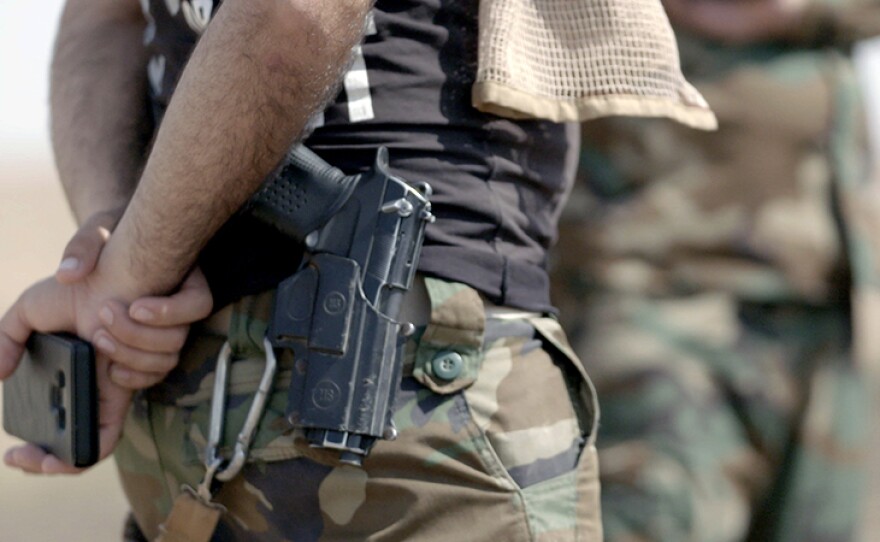Encore Thursday, Oct. 7, 2021 at 10 p.m. on KPBS 2 / On Demand.
In a multi-part hour premiering Tuesday, February 9, FRONTLINE presents two gripping, on-the-ground reports filmed inside Iraq and Yemen that shed new light on underreported crises in both countries.
First, in "Iraq’s Assassins," journalist Ramita Navai travels to Iraq to investigate allegations that Iranian-backed Shia militias are threatening and killing critics and activists with impunity — uncovering evidence of “kill lists” aimed not just at protestors, but business people and politicians at all levels.
“These groups once fought to defend the country from ISIS, but have since expanded into a powerful political and economic force,” says Navai, who has been tracking the rise and power of the Shia militias, and their ties to Iran, for years. “Against the backdrop of a surge in targeted assassinations of protesters, we’ve found that public officials are reluctant to criticize the militias — and that Iraqis say the militias have taken hold of power like never before.”
Navai previously investigated allegations of militia abuses in "Iraq Uncovered." Now, she focuses in particular on the powerful militia group Kata’ib Hezbollah — which the Iraqi prime minister’s influential counterterrorism advisor Hisham al-Hishami had criticized prior to his assassination in July of 2020.
Speaking anonymously because the government’s investigation is still ongoing, an intelligence official involved in the case tells Navai that Kata’ib Hezbollah was responsible for al-Hishami’s murder. The people behind his killing were “mercenaries hired by one of the powerful militias in Iraq … Kata’ib Hezbollah,” the official says.
"Iraq’s Assassins" is a powerful look at the Shia militias and their role in what activists see as a proxy battle between Iran and the U.S.: “Why have we become the fuel for a conflict between two countries who are both free to live as normal?” says Lodya Remon, a charity worker and activist who has been targeted by militias and whose friends have been among those killed.
In the hour’s second segment, "Yemen’s COVID Cover-Up," Yemen-born journalist Nawal al-Maghafi returns to her home country to investigate how the coronavirus pandemic has deepened what has been called the worst humanitarian crisis in the world. Following six years of war between the Houthis, a rebel group backed by Iran, and a Saudi-led coalition, an estimated two million children in Yemen are suffering from starvation and three-and-a-half million people have been internally displaced.
Al-Maghafi was the first journalist from an international broadcaster to be allowed into the war-torn country since the pandemic began. In Houthi-controlled northern Yemen, al-Maghafi searches for the true scale of the COVID crisis, finding evidence of a far higher death toll than Houthi authorities were admitting.
“We found that while Houthi authorities denied the scale of the outbreak and closed off hospitals from journalists, they were rounding up people suspected of being infected,” al-Maghafi says. “And doctors — many of whom are doing their jobs despite no longer receiving a regular salary amid the wartime chaos — told us that when the virus hit, they were quickly overwhelmed."

The situation has been made worse by a lack of supplies, the film reports. A Saudi-led coalition has imposed a blockade on ports in Yemen for the last five years to stop the Houthis from bringing in arms. As a consequence, supplies of medicine, food and fuel are largely cut off, and it can take months for aid to reach people.
Additionally, when the Houthis threatened to tax foreign aid just before COVID hit, the U.S. responded by suspending 73 million dollars from programs it supports in the country. Other countries and aid groups also cut funding around this time.
“We swore a medical oath: If we could help anyone in need, we’d do so,” says Dr. Tariq Qassem, who has been living in a hospital room since March; he says many deaths of his COVID patients were due to a lack of oxygen supply. “Yes, I’m struggling financially, but it won’t stop me working. It doesn’t matter that I’m exhausted. What’s important are the people of my country.”
Making matters worse, Saudi airstrikes have increased throughout the pandemic. In 2020, it’s estimated that there were almost twice the amount as the year before. Many involved US-made bombs. The documentary shows how, between the war, the aid cuts and COVID, millions of Yemenis are in a desperate situation.
"A virus comes from God or from nature, and the whole world is in an uproar as if the world is going to end,” nurse Makiyah al-Aslami, who runs a clinic dealing with malnutrition and maternity, tells al-Maghafi. “All these countries, desperate to find a vaccine. Can’t they find a vaccine that will end this war of ours?"
As President Joe Biden signals an end to U.S. support of Saudi offensives in Yemen, the documentary is a rare and powerful look at the situation on the ground.
Watch On Your Schedule:
Both stories are on demand on PBS, at pbs.org/frontline, on YouTube at at 10/9c, and the PBS Video App.
Join The Conversation:
FRONTLINE is on Facebook, Instagram, tumblr, and you can follow @frontlinepbs on Twitter. #frontlinePBS
Credits:
"
Iraq’s Assassins" is a Ronachan Films production for GBH/FRONTLINE and BBC Arabic, in association with ARTE and ZDF. The correspondent is Ramita Navai. The producers and directors are Ramita Navai and Mais al-Bayaa. The senior producer is Frank Koughan. The executive producer for Ronanchan Films is Sam Collyns. "Yemen’s COVID Cover-Up" is a GBH/FRONTLINE production in association with BBC News Arabic. The director is Nawal al-Maghafi. The producer is Sara Obeidat. The senior producer is Dan Edge. The executive producer for BBC News Arabic is Monica Garnsey. The executive producer of FRONTLINE is Raney Aronson-Rath.





